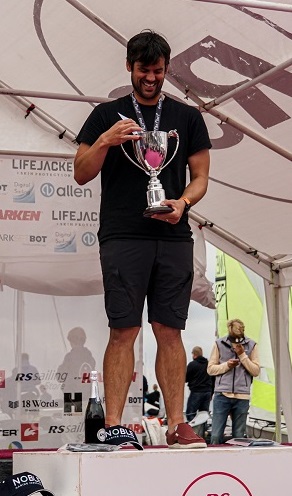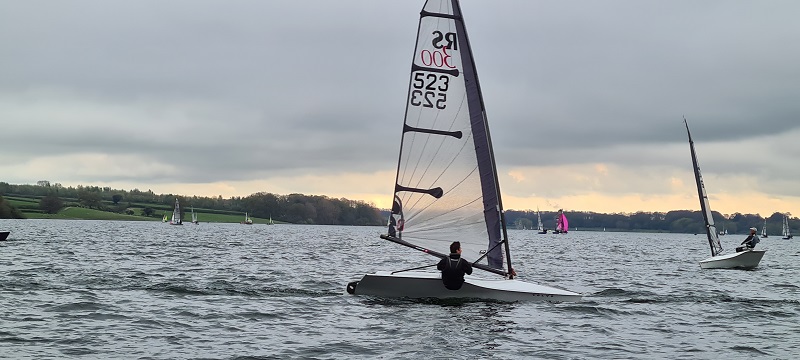Champion Profiles

Paul Watson National Champion 2022
Profile:
I learnt to sail in a GP14 at Blithfield SC with my Dad. Then moved on to learning the basics in an Oppy and Mirror, before going back to crewing for my Dad in a Laser 2000. We sailed together for a few years before I wanted to helm again. I bought a Laser, which I swam around for a couple of seasons. At the same time I became an Instructor which lead me to working for various holiday companies for the next few years.
After returning, and spending a couple of seasons unsuccessfully convincing Emily that I was a reasonable person to sail with, I bought an RS300.
Tips:
Practice Find someone fast and get out training with them. Learn how to keep the boat driving upwind. Work hard and take measured risks on the way back downwind. There's no point being 1st at the windward mark if you’re going to get rolled downwind because the boat feels wobbly.
Try to relax I've always sailed better when I don't put pressure on myself to perform. Relax, find a clear lane in clean wind and sail your own race, you'd be surprised how often you find yourself towards the front if you concentrate on your own boat and not other people’s.
Make sure you stay hydrated after sailing! Just look out for that dreaded boom.
Photo thanks to Digital Sailing
Dave Acres 2015
Profile:
Started sailing a Heron at Cookham Reach on the River Thames when I was 9 and loved it. Then sailed a topper on the sea at Bosham where my Grandparents lived. Mine was fibreglass, before polypropylene was invented. Did my first Nationals in the Topper at Bognor and realised just how much fun big waves were. That was followed by an OK (with wooden mast and boom) and then one of those modern Laser thingies. Did lots of club and youth racing with Glyn Charles who was close mate and taught me a lot. He won the Laser Nationals at 18. Went to Kingston Poly and got into team racing in Larks. Learnt to drink and won the BPSA team racing Championships. Came 12 in the Lark Nationals as a student and then started sailing Laser 2s with Lea (now wife). Managed a 12th at the Laser 2 Worlds (~200 boats) and 5th at the Nationals. Also raced Laser 5000s, RS600s & 700s and then moved on to the 300 in 2009. Easily the best boat so far.
Tips:
Don’t take unnecessary risks. It is best to stay upright. Same rule applies when drinking. Don’t do the Yard of Ale (unless you can do it without pouring all over yourself). It rarely pays to bang corners (unless you’re last). Stay inside the lay lines and try and be on the favoured tack as soon as possible. If it’s windy use lots of kicker and keep the boat, flat and fast. There is always something new to learn so try different things and see if you start going faster than the guys around you.
Remember, ‘Bars’ are good. Good for waves, good for drinking and good for chocolate. Get well acquainted with your bar. You may well get caught in one with Mr Bolland, so acclimatise your body. Stay up late the week before the Nationals and drink a large range of beverages. Practice the Boom of Doom or Mast of Disaster with your mates. Always start a championship with a full breakfast or a good bacon butty and don’t drink lager unless you can burp.
Good luck and look forward to sailing against you all at the Nationals next year. Dave
Champions Profile
Profile:
Dave Acres
Like Mr Bolland I started sailing in a Heron at Cookham on the River Thames with my Mum when I was 9, and loved it. Roll tacking and Gybing up the bank with the wind going round in circles was a great way to learn. At some point (my memory is faded) I became the Southern Area Junior champion. I also sailed a topper on the sea at Bosham where my Grandparents lived. Mine was fibreglass rather than a modern plastic one. I did a Nationals at Bognor and realised just how much fun waves were. That was followed by an OK (with wood mast and boom) and then one of those really modern Laser thingies. Did lots of club sailing and was lucky to race against Glyn Charles who also sailed at Bosham. He won the Laser Nationals at 18 and taught me a lot. Went to Kingston Poly and got into team racing in Larks. Did some serious drinking and won the BPSA team racing Championships. BUSA was a separate event for clever folk at University. Came 12 in the Lark Nationals as a student and then started sailing Laser 2's with my girlfriend (now wife). Best place was 12th at the Laser 2 Worlds and 5th at the Nationals. Also raced Laser 5000's, RS600's & 700's and then found the 300 which is easily the best boat for harbour racing.
Tips:
Winning Tip
Try not to take risks and where possible stay out of trouble. Don't bang corners unless you're really sure there is only one way to go and then stay inside the laylines. Make use of the full range of rig controls to try and get the boat fast, flat and balanced. Practice and try different things with other 300 mates. There is always something new to learn and I know I could go much faster given the time. My boat handling is no where near where it should be and nor is my fitness so my challenge for next year is to set some goals to try and improve these areas.
Alistair Mclaughlin aka "Storky" 2019 National Champion
Profile:
Got the bug in the early seventies crewing for dad in a GP14 at Troon SC. Found a bit of speed somehow and went on to race in 420s with Gavin McGill to win Scottish Youth Championships. Represented GBR in IYRU Youth Worlds in 1977 under the watchful eye of Jim Saltonstall and came top ten of 32 countries entered.
Having raced numerous boats moved into RS300 around 2014, winning locally but at national level. Started to shine in the top ten three years later. In 2019 against Steve Bolland, Steve Cockerell and Steve Sallis won the Nationals.
Won the UK Flying Dutchman Nationals (with Mark Taylor) and been runner up at D-Zero Nationals in 2019 against Mr Bolland. Stork says “that was a bit of fun that one, I turned up as an unknown and unranked player, with a boat I’d bought the week before and had sailed once and set about upsetting the form book with Steve, we both sailed RS Style with loads of kicker and between us owned the pin! ….. who are these RS300 guys, where’d they come from! ….. Steve and I ended up on 14 and 15 points, 10 points ahead of 3rd ….. if you can sail an RS300 …… you can sail anything.”
Tips:
Sail regularly 3 to 4 times a week because the RS300 takes a lot of time on the water if you want to go fast.
Best speed tip ...hike 'til your legs fall off, keep it flat and in a breeze give it all the kicker you can going, upwind - downwind don't sit still and work hard.
To win regularly, live like a saint and never drink at night with Bolland, Acres, Sargent or that bloke McVicar.
Current Boats: RS300, D-Zero, Foiling Moth, B14 and Hornet

Harry McVicar National Champion 2023
Profile:
I'm told my sailing career started as early as 2, when I was tied to the mast of a Hobie Cat with my Dad and Grandad in control. I must've enjoyed it because I don't remember a time before sailing. I started my solo career in the traditional way with an old wooden Oppie, then grew into and out of Toppers, eventually moving into Lasers, at which point the growing stopped just a bit too early for me to be competitive. This took me on a detour into a Byte c2 for a couple of seasons, before I came across some wild looking boat called an RS300. After a quick test sail in no wind, during which I still got blown over, I thought "yes, this is the boat for me". So at 14, my RS300 career began, spending most of my life at Aldenham Sailing Club practising dodging windshifts and the shore. But I also made my Dad take me to as many opens and championships as possible to get all the big pond and sea racing I could.
I spent the next 16 years slowly figuring out how to stay upright, and go a bit faster, in between school, Uni, starting work, marriage and into fatherhood. Iid ticked off a few of the trophies (sprints, opens, traveller series etc..) but the Nationals and Inlands had always alluded me until the stars finally aligned in 2023!
Tips:
As one of the smaller, lighter helms (5'10'', 75-80kg), the key is not losing too much upwind, and attacking hard downwind.
Upwind: lots of kicker, sail low and fast (particularly if it’s choppy) and keep it simple on big courses, 3 tacks maximum. Anything above 15knots use full kicker and sheet no tighter than having the boom over the back corner. As the wind builds further, add downhaul and lift the daggerboard 2-3 inches.
Downwind: run by the lea and practice surfing and being "dynamic" (it’s not pumping officer...). Be aggressively loose with kicker settings and sheet from the forward ratchet until it gets breezy, then get the weight as far back as possible and oversheet to keep the nose up. Drill gybing too, focusing on consistent hand and foot placing and timing. There's always a place to be gained at the gybe mark on a windy day!
Across the wind: surfing again is key, but ultimately set the kicker to as much power as you can handle and hope for the best. The big boys will be faster...
Get fitter... It’s probably not coincidence that the stronger and fitter I've got in the gym, the better my results have been, particularly over long events like the nationals where being less sore than everyone else on Sunday is a big benefit. These boats batter quads, abs, and biceps so work those hard regularly.
Finally, don’t let the competition get in the way of a good time. Being last in the bar is just as important as being first on the water!
Photo of Harry winning 2023 RS Sprints by Malcolm McGregor
Steve Bolland
Profile:
Learnt to sail in the family Heron and GP14 before crewing for my brother in a Mirror, Enterprise and Merlin in pre-teen and teenage years.
Started helming at university in a Lark in the 1980s before eventually winning the Lark Nationals (at the thirteenth time of asking) in 2000. Moved into the RS300 in 2002 and has been National Champion since 2008. Currently sails at Bristol Corinthian YC having been a member of Draycote Water for many years.
Tips:
Get fit and practise. Run, go to the gym, whatever. The 300 is a physical boat and fitness has a huge impact on speed. I’m a lot closer to 50 than 40, let’s face it I’m closer to 50 than I am to 45, so I have to stay fit to keep up with the young guns. Practise heeling the boat to windward upwind and never stop working downwind.


